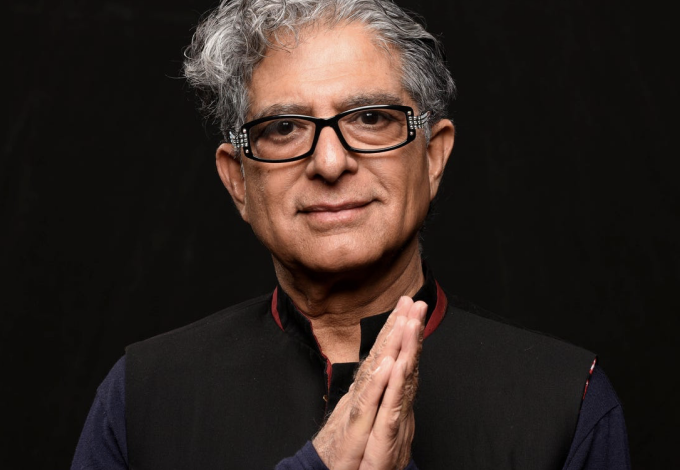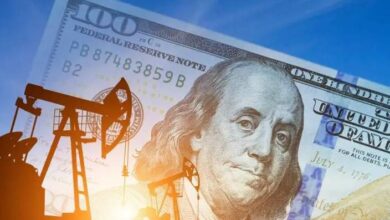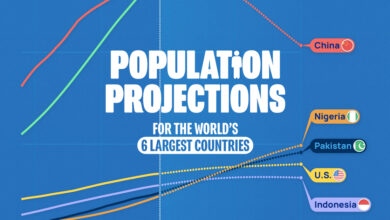How Deepak Chopra Built a Wellness Empire

The White House was calling. They wanted Deepak Chopra, the famed alternative-healing entrepreneur and best-selling author, to join President Biden and Indian Prime Minister Narendra Modi for a state dinner in June. Thanks for the invite, Chopra said, but he already had plans that weekend in England–“launching the Glastonbury Festival with Elton John.”
Talk about an airtight excuse. It’s not easy to get on Deepak Chopra’s schedule these days, let alone find him. Except during the Covid pandemic, he’s been in nearly constant motion for three decades. After Glastonbury, his itinerary would take him to Davos, Riyadh, Mallorca, and Ladakh, a Buddhist centre in the mountains of northern India. “The only way to catch my dad,” his son, Gotham Chopra, has said, “is to catch up with him.”
So I did, circling the globe from Australia to New York in the process. In August, Chopra was in Melbourne for a strategy session with executives from Nike, who were there for the Women’s World Cup. After two days holed up in a nearby vineyard resort with Nike, he was scheduled to give a public talk in the city. Then he would hit the road again: to upstate New York, to help with a ketamine-assisted group therapy session, then to Austin for a silent retreat, back over to England for charity events with Stella McCartney and Kate Moss, a stop in Ireland to collect an award, then to Sweden for a talk, and finally to Greece for a retreat co-hosted with his co-author on his 93rd book, Living in the Light, a yoga guide published in January.
But now here he is, in the executive lounge of his Melbourne hotel, in a comfortable armchair overlooking the Yarra River, wearing a corduroy vest, matching baggy trousers, and sparkle-rimmed Tom Ford glasses. He looks a good decade younger than his 77 years–he sleeps eight hours a night, he says, followed by two hours of yoga every morning and a long walk of about 10,000 steps every day. His workday begins at 11 and ends promptly at 5. The brand of his trademark red sneakers must remain off the record, he notes, because of his relationship with Nike–but “tonight, I’ll be wearing Nikes onstage.”
It’s been 30 years since a single appearance on The Oprah Winfrey Show catapulted Chopra from a little-known holistic Indian doctor to an international wellness superstar, and in that time his own brand has never stopped growing and evolving. In addition to his battery of best-selling books, in 1996 he founded a company to sell consumer products based on his wellness principles. Now called Chopra Global, the company has offered everything from Ayurvedic supplements to holistic health retreats (starting at around $6,800 for five days) to a $350 pair of Dream Master meditation glasses that came equipped with flashing coloured LED lights and earbuds for listening to Chopra’s incantations.
The glasses may not have caught on, but acceptance of Chopra’s ideas most certainly has spread. The global wellness industry–everything from spas to complementary medicine to wellness tourism–barely existed 30 years ago and is now estimated to be worth more than $4.5 trillion, according to research by the nonprofit Global Wellness Institute. “Deepak Chopra has been a huge influencer,” says GWI senior research fellow Ophelia Yeung, an economist. “He’s involved in half of the [11] wellness categories that we look at.”
The highest echelon of corporate America has gotten on board. In addition to his work with Nike (he’s helping develop Nike Well Collective, a wellness-focused brand geared toward women), Chopra is a senior scientist for Gallup, helping the polling company assess Americans’ health and happiness. He recently collaborated with JPMorgan Chase on the design of its new 60-story Park Avenue headquarters in Manhattan, which will have enhanced natural light, fresh air circulation, and spaces dedicated to yoga and meditation.
This year marks another pivot point in his career. In March, he sold Chopra Global, whose CEO is his daughter, Mallika, to a conglomerate called the Healing Company, in a deal estimated to net him $20 million. “The aim of the acquisition is to team up to create a more than $100 million business,” Healing Company CEO Simon Belsham said at the time. But while Chopra remains an adviser and owns a minority stake in the new parent company, he seems relieved to finally step back from direct involvement in the business he created.
“In my tradition, there are four phases of life, or ashramas,” he tells me. The first phase is education, the second is fame and fortune, and the third is giving back. “Now I’ve entered the fourth ashrama, which is called self-realization–where you look back and say, ‘Who am I? What am I doing here? What does it mean?’ “
Make no mistake: The fourth ashrama is not a retirement. Chopra remains head-spinningly busy. Now he works through core vehicles including The Chopra Foundation, which focuses on raising awareness around mental health; his own personal LLC, through which he publishes books and consults; and a small venture fund called ChopraX, which works with several companies, including an early-childhood education business called Begin and a telehealth platform called CareSpan, which will be offering something called Chopra Whole Person Care–basically a form of integrative medicine. Finally, Chopra is chief wellness officer for the Institute for Integrative Nutrition, which trains educators in meditation, yoga, Ayurveda and coaching. The organization has more than 5,000 certified teachers around the world.
Chopra has recently been working with Tom Ford on a new fragrance, Myrrhe Mystère, whose purchasers will be able to access an exclusive guided meditation. He’s working with a real estate developer in Utah to create a wellness community near Park City. He’s working with the mortgage company Guaranteed Rate to release a new app that contains information on mortgages as well as content around meditation, yoga, and wellness. “Financial stress is one of the top stresses in life,” explains Chopra’s business manager, Jared Schoenfeld. Guaranteed Rate also sponsored two weeks of Chopra segments on the massive TSX screen in New York City’s Times Square last month, timed around World Mental Health Day.
It’s a pretty full plate for someone who says his main job now is “to prepare for death.” (“He’s melodramatic,” says son Gotham.) But even as Chopra is asking himself the hard questions inherent to the fourth ashrama, there is much that the rest of us can learn from his extraordinary life. To that end, I managed to keep him in place for multiple hours of deep conversation–and a framework emerged for understanding his spiritual and entrepreneurial journey. In true Chopra fashion, it’s not a road map, but more a set of principles for going where your path takes you. Call it the Four Laws of Deepak.

The First Law of Deepak:
Accept Opportunity
To hear Chopra tell it, his entire business career was unplanned, almost accidental. “It was just happening,” he insists. “I didn’t seek it out.”




